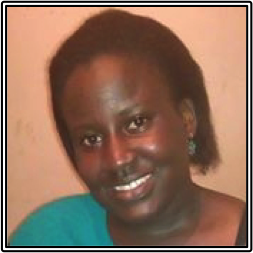Lois Bayigga
Lois is a 27 year old female post-graduate research assistant at Makerere University. Originally from Luweero, she joined MUK in 2007. At MUK she earned her Bachelor’s Degree in Biomedical Laboratory Technology and her Master’s in Immunology and Clinical Microbiology.
As a researcher, she worked with Dr. Damalie Nakanjako at the Immunology Lab, MUK Medical School, where she investigated the mechanisms that lead to post-treatment suboptimal CD4+ reconstitution in HIV-infected patients. In the past, she worked with Dr. Misaki Wayengeraon on the development of a rapid point-of-care diagnostic test for Ebola.
Lois first learned about the BUSM-MUK Fogarty Training Program through advertising posters at her institution, and through the counseling and mentoring of Dr. Nakanjako, who instigated and supported her application.
She arrived in Boston in September 2014 and joined Dr. Deborah Anderson, PhD in her efforts to unravel the interaction of human monoclonal antibodies (mAbs) with cervicovaginal epithelial cells, and their effect on cell-associated HIV transmission.
So far, Lois has broadened her network in the scientific community and gained skills in HIV and sexually transmitted infections (STIs) transmission. About BUSM, she says “I am working in highly equipped facilities with highly trained professionals.”
Lois came to Boston hoping to broaden her perspective on science and life. She felt welcomed in the program and describes American people as very warm and diverse. She has thrived on the opportunities to explore and expand her personal interests – “there are so many opportunities to interact and collaborate with the work of other research groups, both in and outside the BU community”.
Her ultimate goal is to become a faculty member and have her own lab at MUK. She is most interested in immunology, and would like to keep investigating host-pathogen interactions in HIV-infection and coinfections, as well as the mechanisms of response to antiretroviral therapy, and how to more effectively treat opportunistic infections.
What would Lois say to prospective applicants?
“This program opens so many doors, it is an opportunity to learn new skills, and to experience a social environment that is so different from home!”



